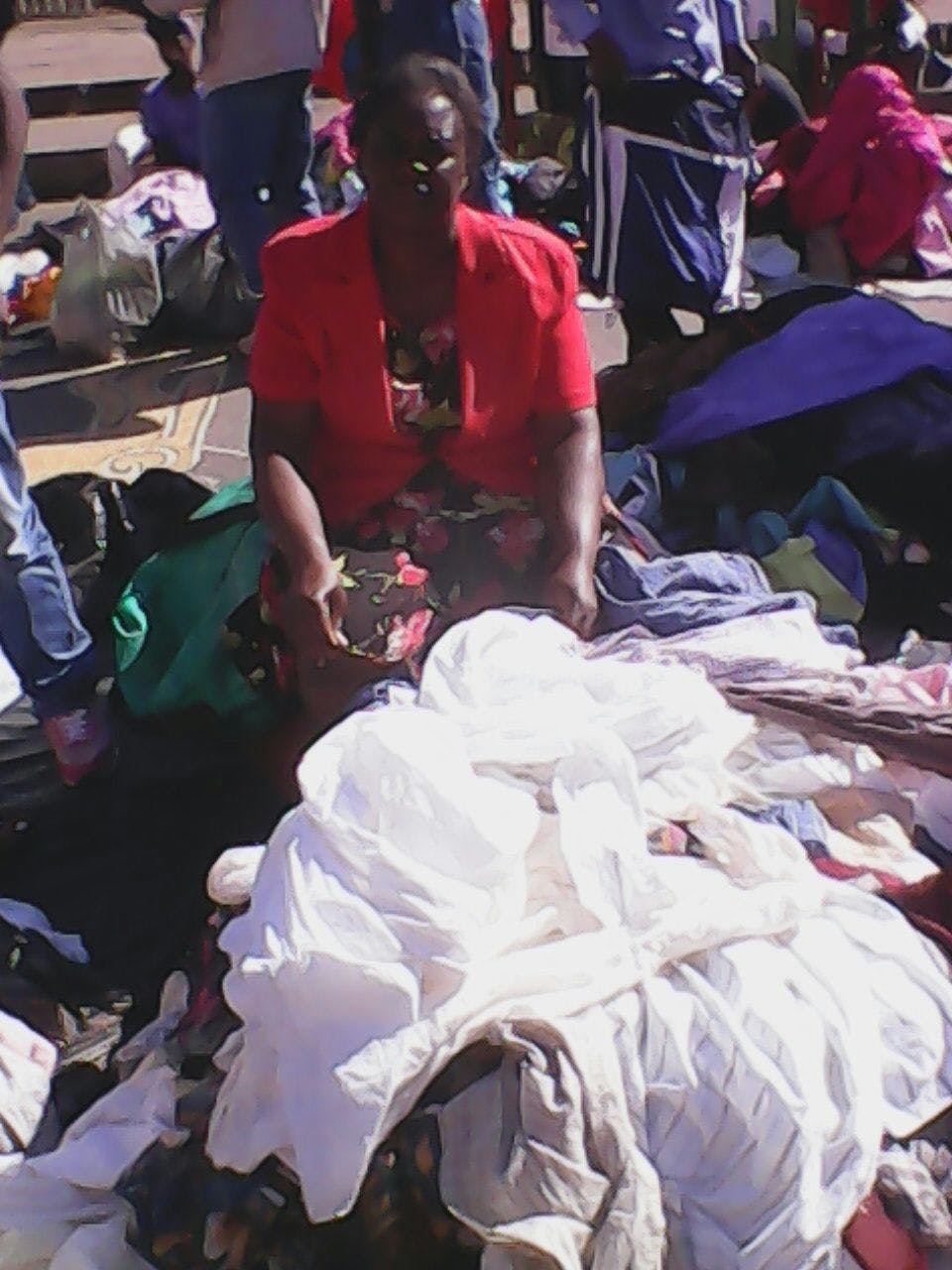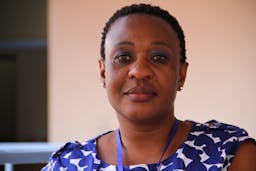Promoting informal markets for sustainable livelihoods
May 28, 2019
Story

“My name is Simbiso. My husband died of HIV/AIDS in 1992. He was unemployed and our resources got exhausted during his illness. I am HIV positive. After his death life became difficult in the village where I lived with my four children, who subsequently dropped out of school. Food was scarce, and getting assistance from my in-laws was on condition that I became a second wife to one of them.
I refused, and visited my sister in town to seek help. She introduced me to a women’s round table, paid the initial subscriptions for me, and gave me money to start a small business. I made profits and sent food to my children in the village. My in-laws banned me from visiting my children. My friends at the market told me that it was my right to have custody of my children. I took my children to town with the help of the police and Child Protection Society. When my turn for the round came I bought a bale of old clothes and expanded my business. I made good profits and joined women who went to Mozambique to fetch cheaper bales of second hand clothes for resale. At first it was tough because we did not have import licenses and had to evade border procedures. This did not help as corrupt police officers waylaid us and confiscated our goods demanding bribes. We contributed money, formed a partnership and got a group import licence. Now we can easily bring in our bales of clothes and take advantage of the increased rebate to reduce import duty.
I have five stalls where I sell from in this market, and I employ 4 helpers. In 1995 our group of women took action against the municipality regulations prohibiting individuals to book more than one stall. Now we can book stalls according to ability, and alongside men. I also joined WOZA in 2005, and took part in peaceful demonstrations against the municipality and the police who arrested us for selling in the informal market. Some even confiscated our goods. I joined the women’s housing co-operative, got a residential stand, and am building a six roomed house. I have a bank account, and all my children are in school. The eldest is in University.”
The above story is a true one told by one of the women in a market women group that I lead in Zimbabwe. The group has a membership of twenty five women. Zimbabwe, like other African countries accepted the World Bank/IMF Economic Structural Adjustment Programme, (ESAP), in 1990. One critique of ESAP has been its adverse effects on the vulnerable groups in the country, especially women.[1] (Gibbon et al: 92) It heightened gender inequalities in relation to men and women’s paid and unpaid work, locking women in the lowest rung of the economic pyramid.[2] (Brendel et al: 1993)
In Zimbabwe the situation is worsened by the current economic, social and political crisis. Women constitute only 27.3 5 of workers in the formal sector. 62.65 % are men.[3] A few ordinary women in Zimbabwe own land and immovable assets which are a prerequisite for them to acquire business loans from banks, to sustain bigger and competitive business ventures. Owing to this, the informal sector has become favourable terrain for women to discover new survival strategies for re-gaining power lost through years of poverty and neglect by the state. They use the informal sector to raise money for food and children’s education, but also as a space to fight unfair laws, policies and cultural practices that deny them access to opportunity and resources.
My market activism work in Zimbabwe is linked to my personal life experiences. In 2010 I became jobless owing to dwindling donor funds. My situation demanded lots of shape-shifting for survival. I joined the informal traders, crossing the border to buy various items for resale in Zimbabwe. Constant reflexivity as a feminist kept me aware of how struggles to merely put food on the table can divert one’s attention from major feminist struggles. I thus turned to researching and writing on women informal traders’ experiences in a manner that gives value to their struggles as an additional preoccupation.
I worked hard to build a relationship of trust with the women, to gain access into their domains. Slowly the women started to regard me as part of their community and opened up their personal experiences for this herstory.
Learning from others
I never seemed to reach a point of satisfaction. I wanted to continue learning from others, to see how the market place could become not just a source of hand to mouth survival, but a source of personal empowerment and growth. This was made possible by my encounter with the Zimbabwean women cross boarders one day in Johannesburg.
I caught up with Loina in Johannesburg, at a place where Zimbabwean cross-border women lodged in a big single room, specially designed to accommodate foreign cross-border traders.[4] The room accommodated 20 women, who paid an equivalent of USD2.00 each per day for lodging fees. There were bathrooms and toilets inside, and each woman had space equivalent to the size of a single bed to herself. There were cupboards to store food, kitchen utensils, clothes and business wares, and women took turns to cook from shared stoves. This is the story Loina shared with me.
“The turning point for me was when I found my husband with a live in girlfriend in my matrimonial house. I was coming from one of my cross border trips. I tried to reason with my husband but each time I left there was a new story. My husband was unemployed, he was retrenched in 2000. I decided to leave him than contract HIV. I have lived in this place for 5 years now, and only go back home quarterly, to see my children and to fetch more wares for resale. I send groceries, school fees and clothes monthly and communicate with them over the phone.”
The women had a house committee that regulated living and other issues. The rules were well articulated in a constitution and code of conduct. You got a copy of these on arrival, upon registration. New members could only be admitted on temporary basis, to replace the few women who would have travelled back home. Some of the rules were:
No men inside the room visitors can only be entertained outside Respect of each other beliefs. No money in the room, all money to be banked after collection Doors close at 7pm
I booked myself into this residence for 5 days in order to observe the day to day activities of the women. Each individual led a separate lifestyle of her choice, and had a separate timetable for business. Women vacated the room at 9am every day to go to different places where they sold their wares, and came back when doors reopened at 5pm. Security was provided by the owners of the building. The women had a self-imposed curfew, and made it a point to be indoors by 6pm, given the prevalence of rape and violence in Johannesburg. They prepared their supper between 5 and 8pm.
8 – 9pm was debate time, where they discussed issues of concern such as HIV/AIDS, rape and violence against women; the political and economic situation back home and shared other survival and coping strategies. Saru and Mavis loved beer, and would drink a few bottles each during the discussions. Mai Mutsa belonged to a religious sect and knelt in a seclude place each night after the discussions, before she went to bed, to recite her prayers.
Every Sunday night there was a group meeting to discuss their projects. The women formed a burial society and pay monthly contributions to cover themselves and their families back home against funeral expenses. They had also formed a savings group where members can borrow money and return it with interest monthly. Every month they contributed 500 rand, gave 5 people ZAR1 500 each and banked 2 500 in the loans savings account. This is repeated monthly.
Having learnt from all these experiences, I started reflecting on how I could also champion the informal sector as a space in which women build alliances to claim their identity, build solidarity for freedom and independence and organise for sustainable livelihoods without any permanent reliance on male dominated relationships, especially those that cause violence against women. This is how the Tasimuka market women’s group was formed.
About the Group
We sell at Epworth open market, and we sell anything and everything, from a ‘scotch cart to a train.[5] This group of 25 women has risen from hopelessness to life. Together we have written a constitution, in our own way. Together we have formed a burial society, and we are moving towards opening a collective bank account for rotational business loans. Our children are eating and clothing decently, and they are going to school like any other. Most important of all, we are benefitting from the women’s rights movement building initiatives that we undertake through the women’s rights discussions we hold, the feminist popular education we share and other business literacy initiatives we share as a group.
Our plan for 2015 and beyond
Our plan is guided by the desire to use the market as a platform for both feminist activism and women’s economic empowerment. In everything we do we are guided by Aristotle’s belief that, ”You must live your entire life with honour and commitment. You must try to build something larger than yourself: a community of citizens, a community of reason, a just and peaceful world. You may be defeated, because violence, arrogance and unreason are powerful forces in history. But that does not diminish your responsibility.”
Since we work with women marketers who also play different roles as mothers, wives, lovers and community builders, our plan is cognisant of two things:
Maximising on time in everything that we do so that we do not disturb the chain of events in people’s personal lives, tackling issues that speak not only to our needs, but the needs of many other women around us, and these include: Health and well-being; Feminist education – Understanding power dynamics and strategizing against destructive power structures.; Safety and security; Selling and fund-raising for sustainable livelihoods. Our major challenge is lack of capital to engage in bigger business projects like going to Dubai to order phones and computers for better proficts. We also desire to register permits so that we can sell our hand made baskets across the boarders in a formal and more sustainable manner. Our desire is to set up a women's rotational fund where women can borrow money for more orders at low interest and return after selling and making ore profits. Banks in Zimbabwe are faced with a liquidity crunch, and cannot loan out money to women, especially women who have no fixed assts for collateral.




